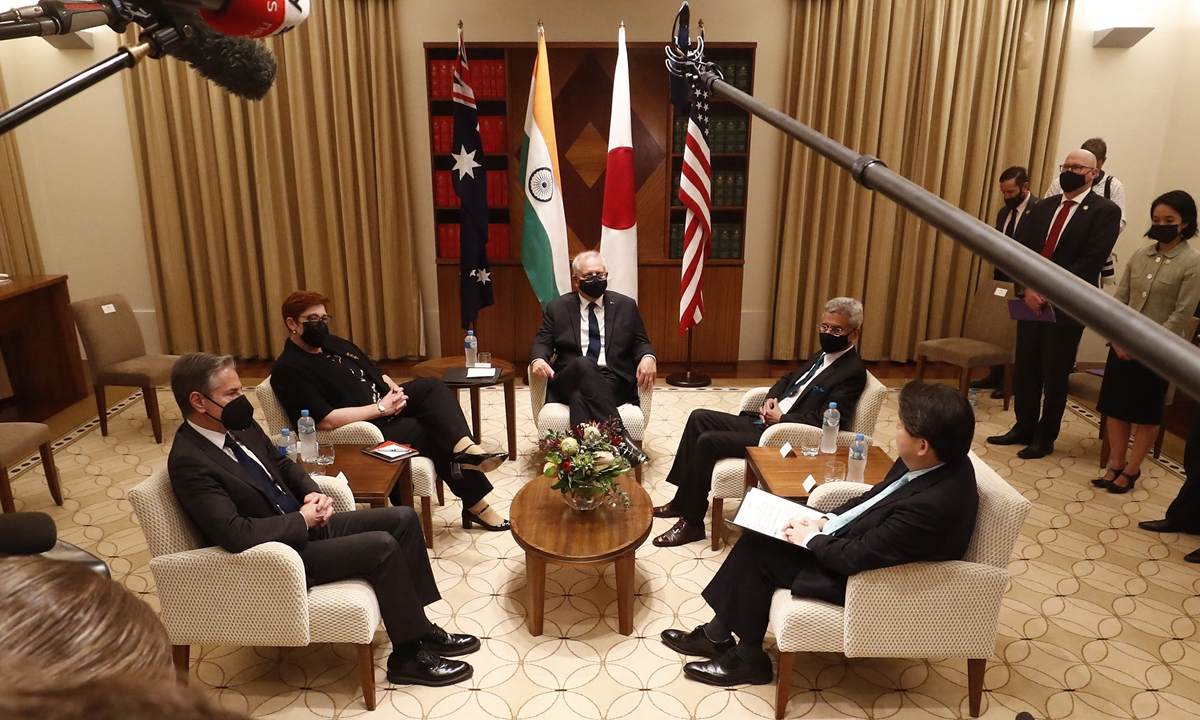US ropes in Quad allies to fight ‘two-front wars’ with China and Russia despite spent force
Globe News 2022-02-20 10:44:281238975Thailand News TimesNewsCenter

Australian Prime Minister Scott Morrison (center) addresses US Secretary of State Antony Blinken (left), Australian Foreign Minister Marise Payne (2nd from left), Indian External Affairs Minister Subrahmanyam Jaishankar (2nd from right) and Japan's Foreign Minister Yoshimasa Hayashi (right) before a Quad meeting in Melbourne on February 11, 2022. Photo: AFP
The sign is clearer than ever that the US is turning Quad into a tool to serve its own strategic goal of countering China and Russia simultaneously, observers said, as US Secretary of State Antony Blinken brought the topic of the Ukraine crisis to the Friday meeting of Quad foreign ministers even though this group of US, Australia, Japan and India was formed for "Indo-Pacific" affairs and to target China.
Blinken said the US must stand up with its allies for a rules-based system threatened by "Chinese aggression" and the world's response to the Ukraine crisis was being watched by "others," which Bloomberg said was a pointed reference to China's "expansion" in Asia. Blinken also warned that Russia is amassing more troops and an invasion of Ukraine could come "any time" though Kremlin had denied such intention and urged the NATO to restrain itself.
Chinese experts believe Washington is trying to declare it is determined to fight and can win on two fronts - China and Russia - at the same time to emphasize the US' hegemonic status and try its best to mobilize as many allies and partners as possible to serve this strategic goal amid anxiety over unprecedented China-Russia relations.
But they pointed out the Biden administration has seriously misjudged itself and the international situation because the US today, deeply split and plagued by domestic problems, has neither the capability to contain two major powers simultaneously, nor the leadership to maintain trust from allies.
Drowning man
On Thursday, US President Joe Biden urged Americans in Ukraine to leave immediately and warned "things could go crazy quickly" in an interview with NBC. The remarks were interpreted by Chinese observers as another hype of a "Russian invasion" threat to persuade its allies to join actions against Russia.
The US plan worked to a very limited extent when Japanese Foreign Minister Yoshimasa Hayashi said it "shared grave concerns" over Russian military buildup during his meeting with Blinken. Australian Foreign Minister Marise Payne also said "Russian military build-up on Ukraine's border has deeply concerned Australia and our allies and partners" despite the fact that Australia, very isolated in the South Pacific, has little contact with Russia and no interest on the issue.
Chen Hong, a professor and director of the Australian Studies Centre at East China Normal University, told the Global Times on Friday that the US is eager to combine all its tools and mobilize US-led platforms to tackle the Ukraine crisis and China's rise all at once.
Lü Xiang, a research fellow at the Chinese Academy of Social Sciences, told the Global Times on Friday the US was more like a drowning man clutching at a straw. But the more the US wants to leave its own people and the world an impression that it can manage confrontations against China and Russia and maintain a US-led world order, the more embarrassing a situation it is in because its failures in domestic governance, in the democratic system, in overseas operations such as the Afghan withdrawal, are obvious to all.
Chen also said mixing up the Ukraine crisis and Indo-Pacific strategy exposed US anxiety on the China-Russia relations "without a limit," which was further consolidated through a joint statement signed after the face-to-face meeting of the two top leaders on February 4 ahead of the opening ceremony of the Beijing Winter Olympic Games.
Yury Tavrovsky, head of "Russian Dream-Chinese Dream" analytic center of the Izborsk Club, told the Global Times on Friday that the US under Trump overestimated its potential of waging two "cold wars" simultaneously and added "China front" to the already functioning "Russia front."
Now Biden wants to rope in all liberal capitalist countries to shore up America's declining power, and the Quad, AUKUS and so-called summit for democracy are the manifestations. This way further divides the world and accelerates China-Russia partnership, the expert said.
Sergey Biryukov, a professor at the Siberian Institute of Management in Novosibirsk of Russia, told the Global Times that as a result of their developing partnership, China and Russia have gained opportunities to contain the militarization of the region through the structures of Quad and AUKUS.
Wills and realities
The US wanted to tout the "China threat" in the Indo-Pacific and "Russia threat" in Europe, but lacked a clear mind on how much its allies would buy into it, experts said.
The Quad itself is not a capable mechanism and can hardly yield any concrete results, not to mention Quad members are cautious of making Russia their target, Lü said.
Japan, despite territorial disputes with Russia, won't take it as a priority and India won't see Russia as a target either. The US can get nothing more than verbal support on the Ukraine issue at the Quad table, experts said.
Though India may have the motivation to create trouble for China via Quad, it has more to care about internal affairs, including the epidemic, supply chains and commercial technologies, experts said.
The US may woo Japan to stir up trouble for China as the two East Asian neighbors are having some difficulties in bilateral relations. But Japan won't completely serve as a US tool and it has maintained dialogue channels with China to handle problems and manage conflicts.
Australia appears to be the only loyal US follower in the bloc, betting all on worsening China-US relations like a desperate gambler and even mulling to expand their target to Russia, but the US won't appreciate Australia's sacrifice or compensate the losses when the US has a policy adjustment, experts said.
Lithuania, a non-Quad country, sent its foreign minister Gabrielius Landsbergis to Australia to seek more support for its stance amid spats with China. The country also has intense relations with Russia. Experts said the Baltic nation is tied so close to the US boat by some politicians that it has little flexibility to do what's beneficial for its people.
Lü said the US sets fire everywhere to demonstrate its competence and attraction in front of allies, and uses whatever tools at hands to win the "two-front battle," but it has forgotten it no longer has the leadership to ask others to extinguish the fire.
Allies have to think twice before making real commitments beyond rhetorical support for the US considering uncertainty in American domestic politics, namely the midterm elections and the 2024 presidential election, experts said.
The latest F35 crash and nuclear submarine collision in the South China Sea reminded the public of how much the US can achieve amid its ambitious Indo-Pacific strategy, Lü said.
ก่อนหน้า:Singapore Airshow expects sharp fall in visitors
ถัดไป: Self-treatment launched in South Korea for mild cases
ถัดไป: Self-treatment launched in South Korea for mild cases
การอ่านที่เกี่ยวข้อง
- Environmental dilemma
- Aid flight arrives in Tonga; phone lines partially restored
- China-ASEAN Innovation and Entrepreneurship Competition is now Open for Applications
- Putin says Russia will station tactical nukes in Belarus
- Parañaque limits movement of unvaccinated
- Former Philippine President Duterte Faces ICC Trial Amid Sovereignty Dispute; Supporters Decry
- Singapore Airshow expects sharp fall in visitors
- " Celebrate Chinese festivity During the Incredible Lantern Festival." 2022 Global Oversea
- President Xi Jinping and Azerbaijani President Ilham Aliyev meet in Samarkand
- Protests spread
